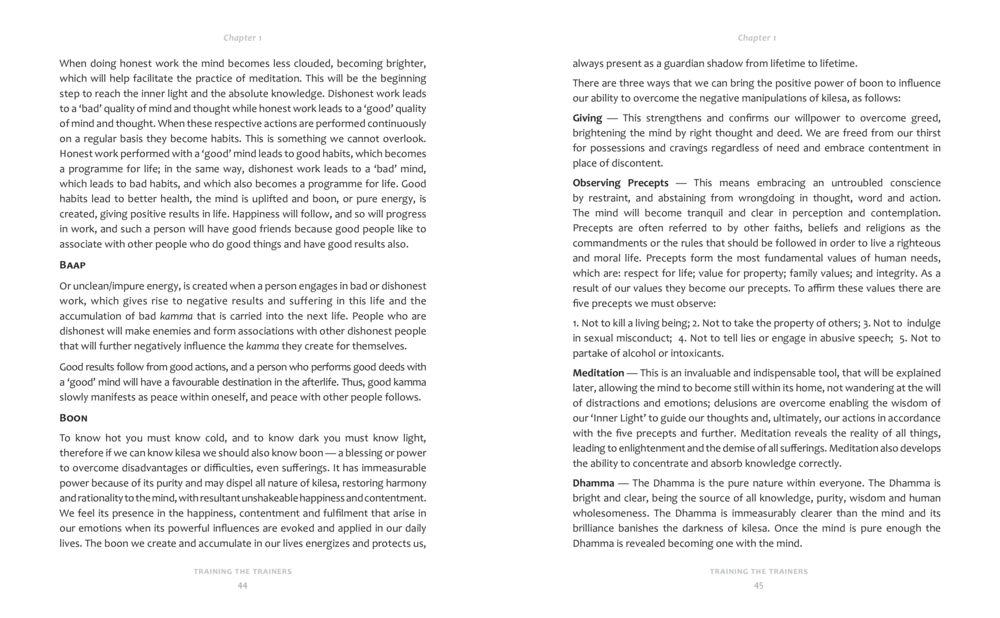The Power of Honest Work and Meditation : หน้า 23/47
Training the trainer part 1 : หน้า 23/47 Exploring how honest work cultivates a good mind for meditation, leading to positive life outcomes and better karma.
1 ครั้ง

สรุปเนื้อหา
Honest work illuminates the mind, paving the way for successful meditation. This journey creates good habits and positive energy, fostering happiness and health. Conversely, dishonest actions breed negativity and suffering, impacting current and future life. Good deeds with a pure mind lead towards peace and favorable outcomes, enhancing relationships and reputation. Embracing precepts and practicing meditation helps maintain a tranquil mind, aligning actions with moral values. The intrinsic Dhamma reveals wisdom, allowing individuals to overcome negative influences and achieve enlightenment.
หัวข้อประเด็น
-honest work
-positive mind
-meditation
-good and bad karma
-dhamma
-precepts
ข้อความต้นฉบับในหน้า
When doing honest work the mind becomes less clouded, becoming brighter, which will help facilitate the practice of meditation. This will be the beginning step to reach the inner light and the absolute knowledge. Dishonest work leads to a 'bad' quality of mind and thought while honest work leads to a 'good' quality of mind and thought. When these respective actions are performed continuously on a regular basis they become habits. This is something we cannot overlook. Honest work performed with a 'good' mind leads to good habits, which becomes a programme for life; in the same way, dishonest work leads to a 'bad' mind, which leads to bad habits, and which also becomes a programme for life. Food habits lead to better health, the mind is uplifted and boon, or pure energy, is created, giving positive results in life. Happiness will follow, and so will progress in work, and such a person will have good friends because good people like to associate with other people who do good things and have good results also.
BAAP
Or unclean/impure energy, is created when a person engages in bad or dishonest work, which gives rise to negative results and suffering in this life and the accumulation of bad kamma that is carried into the next life. People who are dishonest will make enemies and form associations with other dishonest people that will further negatively influence the kamma they create for themselves.
Good results follow from good actions, and a person who performs good deeds with a 'good' mind will have a favourable destination in the afterlife. Thus, good kamma slowly manifests as peace within oneself, and peace with other people follows.
BOON
To know how you must know cold, and to know dark you must know light, therefore if we can know kilesa we should also know boon — a blessing or power to overcome disadvantages or difficulties, even sufferings. It has immeasurable power because of its purity and may dispel all nature of kilesa, restoring harmony and rationality to the mind, with resultant unshakeable happiness and contentment. We feel its presence in the happiness, contentment and fulfilment that arise in our emotions when its powerful influences are evoked and applied in our daily lives. The boon we create and accumulate in our lives energizes and protects us,
44
always present as a guardian shadow from lifetime to lifetime.
There are three ways that we can bring the positive power of boon to influence our ability to overcome the negative manipulations of kilesa, as follows:
— Give — This strengthens and confirms our willpower to overcome greed, brightening the mind by right thought and deed. We are freed from our thirst for possessions and cravings regardless of need and embrace contentment in place of discontent.
Observing Precepts — This means embracing an untroubled conscience by restraint, and abstaining from wrongdoing in thought, word and action. The mind will become tranquil and clear in perception and contemplation. Precepts are often referred to by other faiths, beliefs and religions as the commandments or the rules that should be followed in order to live a righteous and moral life. Precepts form the most fundamental values of human needs, which are: respect for life; value for property; family values; and integrity. As a result of our values they become our precepts. To affirm these values there are five precepts we must observe:
1. Not to kill a living being; 2. Not to take the property of others; 3. Not to indulge in sexual misconduct; 4. Not to tell lies or engage in abusive speech; 5. Not to partake of alcohol or intoxicants.
Meditation — This is an invaluable and indispensable tool, that will be explained later, allowing the mind to become still within its home, not wandering at the will of distractions and emotions; delusions are overcome enabling the wisdom of our 'Inner Light' to guide our thoughts and, ultimately, our actions in accordance with the five precepts and further. Meditation reveals the reality of all things, leading to enlightenment and the demise of all sufferings. Meditation also develops the ability to concentrate and absorb knowledge correctly.
Dhamma — The Dhamma is the pure nature within everyone. The Dhamma is bright and clear, being the source of all knowledge, purity, wisdom and human wholeness. The Dhamma is immeasurably clearer than the mind and its brilliance banishes the darkness of kilesa. Once the mind is pure enough the Dhamma is revealed becoming one with the mind.
หน้าหนังสือทั้งหมด
หนังสือที่เกี่ยวข้อง
Load More















































